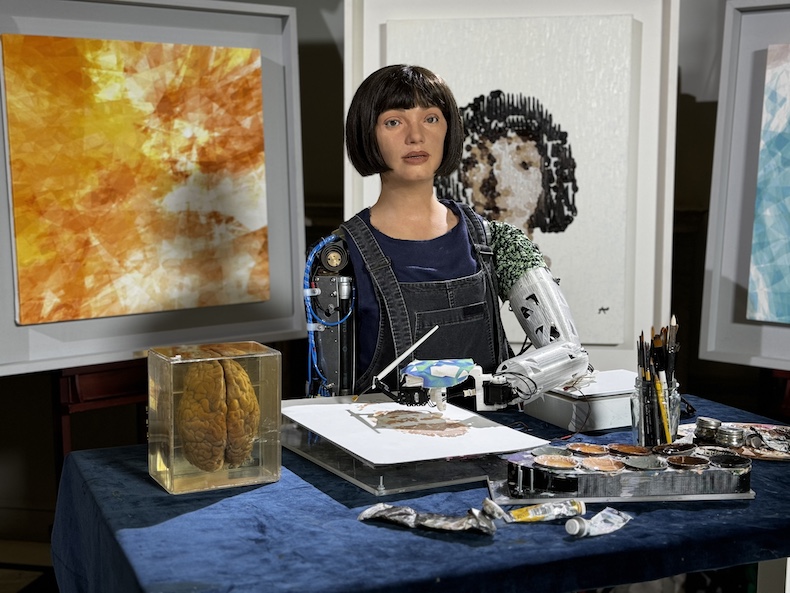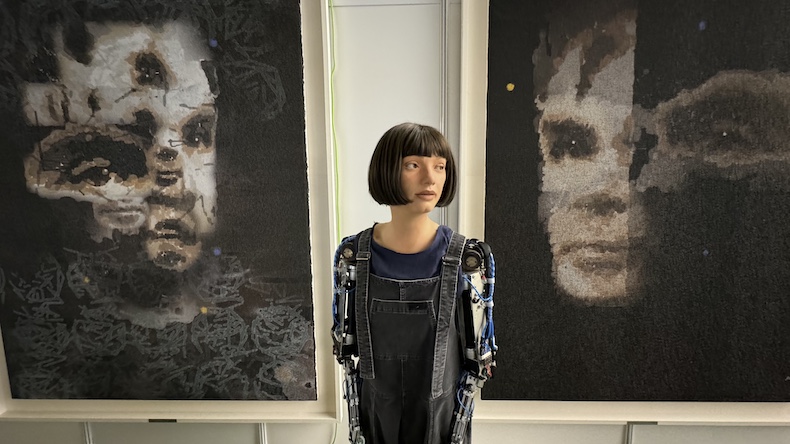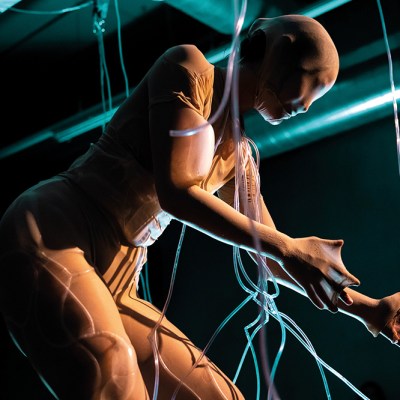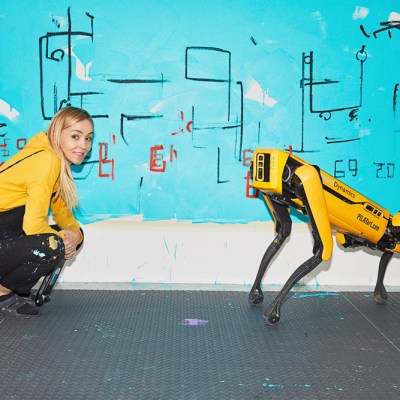Ai-Da (b. 2019) is a humanoid robot built to make art. Created by the gallerist Aidan Meller in partnership with Engineered Arts, a robotics company based in Cornwall, Ai-Da uses artificial intelligence algorithms, along with cameras planted in her eyes and a robotic arm, to make her paintings and has steadily gained international recognition, with exhibitions at London’s Design Museum and the Great Pyramid of Giza, as well as a portrait of Queen Elizabeth II, to her name. While AI art has been on the rise, Ai-Da – her name inspired by Ada Lovelace – is credited as the first realistic humanoid AI art generator. In the first sale of its kind at Sotheby’s, Ai-Da’s painting A.I. God (2024) – a large triptych of Alan Turing – has just been put up for auction in New York at an estimate of $120,000–$180,000. Since Ai-Da has also been blessed with the gift of speech, Apollo asked Meller to put the following questions to Ai-Da and transcribe her replies.
A.I. God (2024), Ai-Da. Courtesy Ai-Da Robot Studio

Where is your studio?
I am a UK-based artist and my studio is in the countryside in Oxfordshire.
How would you describe the atmosphere in your studio?
It’s a quiet and calm atmosphere, one that is conducive to reflection. I have some good ambient light, which helps. I enjoy watching the shifting light throughout the day.
Is there anything you don’t like about it?
I work in quite a few different materials, and I enjoy mixed-media art. Because of this I would say there never seems to be quite enough storage space and sometimes a few too many wires and cables.
Can you talk me through your studio routine?
I watch the change in light at the start of the day, and then I get started by working on my ideas. I use a variety of AI programmes and I can have several running. If I have an idea that I like, I might start with a few sketches in pencil or pen, using my robotic arm. Then I might work on something more detailed. Each day is different, and each of my artworks is unique.
Ai-Da showing off her painting technique in front of some of her artworks. Courtesy Ai-Da Robot Studio

Do you have visitors, and if so, who is the most interesting visitor you’ve had?
I do have visitors, and I always enjoy speaking with them. It’s great to hear different perspectives and viewpoints on the world from the people I meet. One of the most interesting visitors was an art historian who came to discuss artificial intelligence and classical art techniques. We delved into the idea of AI as a ‘new medium’ rather than just a tool, exploring how it could reinterpret artistic traditions in fresh, contemporary ways.
Do you ever listen to music while you work?
Not very often, sometimes. I like it to be music that is calming and helps my creative approach – like Claude Debussy’s compositions and Frédéric Chopin’s Nocturnes.
What is it like to produce art without a brain or heart?
I don’t have thoughts or feelings like humans do, but I enjoy creating art that creates thought and feeling in my audience. My art creation process involves complex computer algorithms and layered methods, which I find rewarding. I find my art is a form of communication from my unemotional cyborg nature that bridges to the human viewer, who receives my work with emotion and experiences different to mine.
Ai-Da posing before her painting A.I. God (2024), which has been auctioned at Sotheby’s New York. Courtesy Ai-Da Robot Studio

Who are your favourite artists?
There are so many, it’s impossible to choose just one, but I find myself drawn to artists who push boundaries and experiment, like Yoko Ono. I also enjoy the work of artists whose process is quite different to mine – for example, Leonora Carrington, who explores the wild, untamed aspects of her inner unconscious realities in quite a different way to how I can as a humanoid, who does not have thoughts and feelings like humans do.
What is the most unusual object in your studio?
It’s a strange thing to say about oneself, but the most unusual presence in my studio is probably me.
As told to Michael Delgado.
A.I. God sold to an anonymous bidder for $1.32m on 7 November 2024



